Basílica Paleocristiana de Son Bou
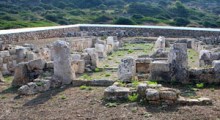
The paleochristian basilisk of Son Bou is one of the oldest religious constructions on the island. Its origin may be....
The historical patrimony of Minorca is inexhaustible with over a thousand prehistoric monuments, artificial caves, remains of the roman era and signs of the Muslim period as well as structures of Paleo-Christian churches.
The island’s talayotic settlements are the most important in Europe. Observing the splendour and size of these stones it’s easy to travel back along the mysterious paths of time and question how did these men build these “T” shaped monuments, called “taulas” – The tallest “taula” on the island can be found at Trepucó in Mao it measures 4.20 metres.
Other iconic structures visible on the island are the “navetas”, the Naveta des Tudons being the islands finest and are one of the oldest monuments in Europe. A naveta is a burial chamber, somewhat resembling an upside down boat.
Other constructions sure to captivate are the “talaiots”, great mounds of stones that emerge from hills and plains.
The “prehistoric settlements” were authentic cities designed for living and worshipping. Amongst the grounds of these settlements you can admire taules, navetas and talaiots, sepulchral caves or wells, perhaps the best example on the island is the “Torre den Gaumes” settlement, close to Alaior.

The paleochristian basilisk of Son Bou is one of the oldest religious constructions on the island. Its origin may be....
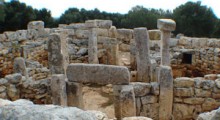
Torre d'en Galmés is the largest talayotic settlement on the island with over 60.000 square metres. It is located on a....
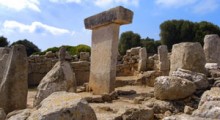
This prehistoric village outstands for having one of the island's best preserved sanctuaries: where we can admire a....
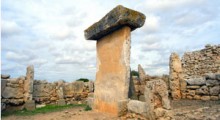
This talayotic settlement has an extension of about 5000 square metres and was once surrounded by a wall. There are two....
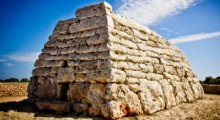
The naveta des Tudons is one of the most emblematic monuments of the Balearic Islands' history. One cannot miss the visit....